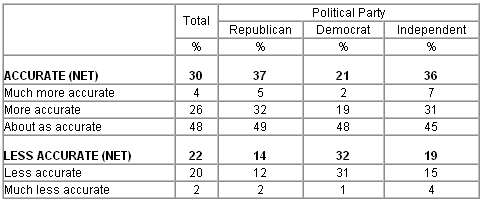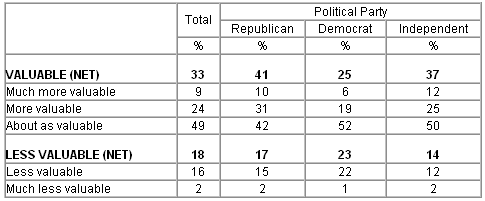1in 5 Read Blogs Regularly, Find More Accurate and Valuable than Mainstream Press
A stunning 22 percent of Americans read blogs several times a week, according to a new survey. Reuters reports on a glass 3/4 empty:
A majority of Americans do not read political blogs, the online commentaries that have proliferated in the race for the U.S. presidency, according to a poll released on Monday. Only 22 percent of people responding to the poll said they read blogs regularly, meaning several times a month or more, according to the survey conducted by Harris Interactive.
[…]
Despite the attention blogs can get, the poll said 56 percent of Americans say they never read blogs that discuss politics. Another 23 percent read them several times a year, the survey showed.
While blogs are largely considered the realm of young people who are most Internet-savvy, only 19 percent of people ages 18 to 31, and 17 percent of those ages 32 to 43, regularly read a political blog, the poll said. The generation most likely to read such blogs are those age 63 or older, 26 percent of whom said they do so. Also, 23 percent of those ages 44 to 62 read them, the poll said.
So, the cohort that’s generally less interested in politics spends less time reading blogs about politics than the generation most inclined to participate and with the most time on the hands?
And, by the way, a 2004 Pew study found that “just more than half of Americans (54 percent) read a newspaper during the week, somewhat more (62 percent) on Sundays, and the number is continuing to drop.” So, blog readership is only slightly below newspaper readership.
The survey itself breaks down the information quite nicely into tables. Unfortunately, no comparison is made as to how much the sample sample reads newspapers, watches the national television news, or otherwise gathers political information.
This, though, is interesting: “Compared to the mainstream news media, the information I read online journals, web logs or blogs is…?”

And:

So, we have a survey showing that 44 percent of Americans read political blogs occasionally and 23 percent read them several times a year. Among those who do, 78 percent find them as accurate or more accurate than the mainstream press and 82 percent find them as valuable or more valuable than the mainstream press. Yet the story is framed as blogs being inaccurate and less widely read than some might think?
UPDATE: Kevin Drum is skeptical of the survey’s findings, thinking it highly unlikely that 22 percent of the public reads blogs regularly and thinks the number is skewed by being an online poll. Could be.
He also wonders why liberals trust blogs less than conservatives despite liberal blogs dominating the space. My guess is that conservatives trust the mainstream press less than liberals (Kevin’s guess as well) but also that both sides most read their own blogs and conservatives trust theirs more. For one thing, there’s an Obama-Clinton split among the netroots, along with various other tensions. Moreover, conservatives look to blogs as an alternative to “the liberal media” whereas liberals seem to gravitate towards blogs as an organizational force.
Most blogs are drivel. A few blogs add valuable commentary to stories reported in the mainstream media. A very small, select set of blogs does wonderful work gathering information, adding context, or correcting mainstream reporting.
Mainstream TV and radio news is a waste of electrons. Local newspapers generally do pretty good local reporting, and some national newspapers (NYT, WSJ, WP, etc.) do great and valuable work.
So… Is the mainstream media more accurate than blogs? Generally, Yes. Is the mainstream media more valuable than blogs? Generally, Yes.
Don’t take it personally James. Your blog is not representative of the overall blog landscape. Consider that a compliment.
And that is the beauty of the internet, you get to decide which blogs get your attention. So even if only 0.01% of all blogs are worth reading, 100% of the blogs you choose to read are worth reading. It’s the ideal environment for market forces to control quality. Compare that to your choice in print or broadcast news, and you can easily see why people feel that blogs are both more accurate* and more valuable.
* The accuracy factor is probably more a perception based on how much a blog reaffirms the reader’s own opinions and priorities, rather than actual accuracy.
All good points Michael.
I don’t think it is accuracy I like about blogs so much as it is the openness about the bias of them.
I know when I go and read a certain blog, the blogger isn’t pretending to be something he/she isn’t, they are upfront with where they are coming from. The mainstream media is still stuck somewhere in pretending they are unbiased and everything they print is neutral.
When I know where the bias is, I can at least balance what they are saying against that bias.
I do think the television media is pretty much worthless outside of maybe the weather report and sports scores.
Blogging has two things that traditional media doesn’t that, in my opinion, make blogs a better source of information:
1) Comments: On a good blog, comments give almost as much information as the article itself. This is especially true of less popular blogs like OTB, where the signal/noise ratio is relatively high. Comment threads offer counter-points, different perspectives, or reaffirmation of the article. Comments also let you interact with the article’s author, to get clarification or an expansion of his/her point.
2) Hyperlinks: Most blog articles reference one or more external sources. This lets readers easily read the source material and anything that it links to. This allows independent verification of the material being cited, which usually leads to more informative comments (see above) about the material. If you are as familiar with the topic as the article’s author, this puts the authority of your comments on the same level as the author’s article.
Agreed that most blogs are drivel and that there’s plenty of excellent content in the MSM. My commentary is on the survey results vis-a-vis the reportage on said survey.
One can reasonably argue that the survey participants’ views are silly. But, rather clearly, the survey is good news for blogs and bad news for the MSM; gleefully reporting it as exactly the opposite might explain why people don’t trust the MSM.
And I say that as someone who finds much valuable information via the MSM, Reuters (the perpetrator in question) included.
Of course most are drivel. Sturgeon’s Law.
I’d also add that we should look at the trends. The number of newspaper readers is declining and has been for decades. The number of people reading political blogs is rising—two years ago the Wall Street Journal reported that 32 million people were reading political blogs. That’s a pretty sharp increase in just that short time.
The irony in this for me is that bloggers are probably newspapers’ best customers. It certainly looks to me as though most political bloggers read newspapers. Lousy way to treat your best customers.
Correction:
Ok, maybe I am the exception, but I read blogs daily (newspapers too) As one who is considered fairly liberal I find it interesting that the first 2 blogs I check every day are conservative
The thing I like about blogs is they are more or less self correcting. If they get a fact wrong we generally know within 24 hrs. A newspaper might take as much as a week.
And most blogs are aware of this fact (somebody is always watching)